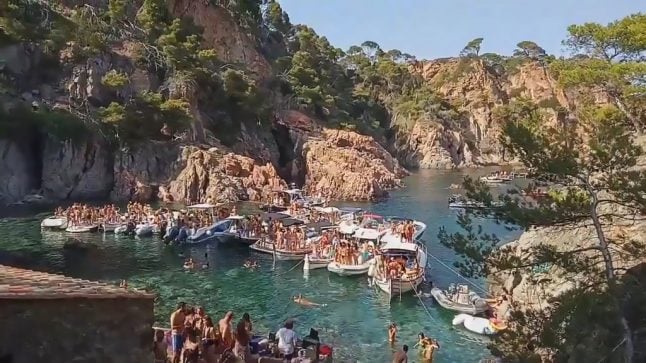But these days its pleasure boats full of bikini-clad revellers pumping out tunes in illegal nightlong “botellones” convened over social media.
Environmentalists have raised concerns about the impact on fragile marine ecosystems in coves along the Costa Brava after a spate of riotous parties.
One video, recorded on July 13 shows some 40 boats moored alongside one another in Cala d'en Massoni, while another was recorded in nearby La Bañera de la Rusa in early August, both protected nature areas around Cap Roig, in Catalonia’s Girona province.
@ajpalafrugell Aquesta gent té permís per fer aquesta festa a Cala Masoni? Hem trucat a @mossos, però no ha vingut ningú. #caproig #espainaturalprotegit pic.twitter.com/RkZVeVoL4z
— Mariona (@MarionaRoca1) July 13, 2019
The ecological organisation Salvem el Golfet, which campaigns to protect the coast of Girona province, demanded that action be taken against the organisers because of the serious environmental impact they pose in an area awarded protection under the Red Natura 2000 scheme.
Police in Lloret de Mar swooped on revellers at another party in a cove outside Lloret de Mar just before dawn on Sunday, identifying five organisers who now face fines of up to €100,000.
Aquesta matinada desmantellada una festa il. legal a una de les nostres cales, espai d'interés natural #Lloret. Els organitzadors, identificats, s'enfronten a sancions de fins a 100.000€. Comissat material d'organització pic.twitter.com/0C8PlJjVPy
— Policia Local Lloret (@PLlloret) August 18, 2019
Ecologists fear the unlicensed parties, which use Instagram, twitter and facebook to alert partygoers of the location, are becoming “the latest thing” and that the boats could damage the ocean floor when they drop anchor as well as the detritus left behind by so many people.
“Such parties may be fashionable in places like Ibiza” said Margarita Riera, head of Salvem el Golfet. “But we cannot allow it to become a thing here.”
Entrevista a la presidenta de l'entitat ecologista Salvem el Golfet, que ha denunciat festes il·legals en cales protegides del Cap Roig https://t.co/c6BK7d11a7
— VilaWeb (@VilaWeb) August 15, 2019
The coves should be for everyone to enjoy but in a responsible way, she insisted. “If someone wants to go an enjoy a swim in the cove, that’s fine but we don’t want dozens of boats full of people mooring together at the same time.”
Last week the provincial government in Girona said they would install buoys to block the entrance into the coves in a bid to clamp down on such parties.



 Please whitelist us to continue reading.
Please whitelist us to continue reading.
Member comments